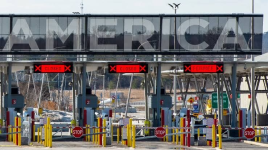Shiftless2
Well-known member

YUMA, ARIZONA — In a bold demonstration of rugged prairie independence, a group of Alberta separatists were reportedly spotted in a sunny RV camp in Yuma this week, collecting signatures for a referendum to leave Canada.
Nothing says “strong and free” quite like launching your sovereignty campaign from a lawn chair beside a luxury RV in a U.S. retirement enclave.
Photos circulating in a Facebook group charmingly titled “Liberals Must Go” show a lineup of snowbirds eager to sign the petition while wearing sandals, sipping iced beverages, and enjoying the fruits of a country they insist is broken beyond repair.
The irony is almost too efficient.
For decades, many of these same boomers built their wealth in Alberta’s oil and gas sector. The very industry that benefited from national infrastructure, federal programs, equalization frameworks, and access to Canadian and global markets. The same industry whose workers rely on Canadian pensions, healthcare, and financial systems. The same industry they claim Ottawa has been “robbing.”
Apparently robbed people can still afford diesel pushers, golf memberships, and six months of sunshine in Arizona.
Even more impressively, they are managing to ....
MORE>




